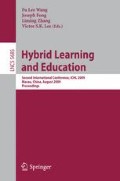Abstract
Despite many potential benefits, hybrid learning is not yet very diffused, because of the issues entailed by a thorough institutional change in this direction. In this paper, we suggest that changes at activity or course level, on the other hand, is not very difficult and onerous to implement, even in absence of a thorough institutional change. To this end, we present the case of a face-to-face course run in a very traditional school setting, that was turned by the teacher into a hybrid one, using as only resources a careful methodological planning and free blog space. The positive outcomes of this experience encourage the application of a similar approach in other situations, thus helping to prepare the ground for a wider transformation in the educational system.
Access this chapter
Tax calculation will be finalised at checkout
Purchases are for personal use only
Preview
Unable to display preview. Download preview PDF.
References
Graham, C.R.: Blended Learning Systems - Definition, Current Trends, and Future Directions. In: Bonk, C.J., Graham, C.R. (eds.) The Handbook of Blended Learning, pp. 3–21. Wiley & Sons, Inc., San Francisco (2006)
Ellis, C.: You can’t do that in a classroom!”: How distributed learning can assist in the widespread adoption of hybrid learning strategies. In: Fong, J., Kwan, R., Wang, F.L. (eds.) ICHL 2008. LNCS, vol. 5169, pp. 1–16. Springer, Heidelberg (2008)
Masie, E.: The Blended Learning imperative. In: Bonk, C.J., Graham, C.R. (eds.) The Handbook of Blended Learning, pp. 22–26. Wiley & Sons, Inc., San Francisco (2006)
Soubrié, T.: Le blog: retour en force de la “fonction auteur”. JOCAIR 2006: Premières Journées Communication et Apprentissage Instrumentés en Réseau, Université d’Amiens (2006)
Blood, R.: Weblogs: a history and perspective (2001), http://www.rebeccablood.net/essays/weblog_history.html (last accessed July 2008)
Brodin, É.: Réflexivité instrumentée en contexte de stage à l’étranger. JOCAIR 2008: Journées Communication et Apprentissage Instrumentés en Réseau, Université d’Amiens (2008)
Develotte, C.: Le journal d’étonnement. Aspects méthodologiques d’un journal visant à développer la compétence interculturelle. In: Blanc, N., Varga, R. (eds.) Rapport de stage et mémoire professionnel, normes, usages et représentations, Lidil n° 34, pp. 105–124. Ellug, Grenoble (2006)
Dompmartin-Normand, C.: Des étudiants d’ailleurs construisent ici un blog communautaire. Les Cahiers de l’Acedle, n°5 (2008), http://acedle.ustrasbg.fr/article.php3?id_article=1012 (last accessed May 2008)
Ellis, R.: Task-Based Language Learning and Teaching. Oxford University Press, Oxford (2003)
Lupi, V.: TIC and new methodologies in language teaching and learning: a contribution from FLE. PhD dissertation, University of Genoa, Italy (2009) (in Italian)
Thompson, A.: Teachers’ beliefs and conceptions: A synthesis of the research. In: Grouws, A.D. (ed.) Handbook of research on mathematics learning and teaching, pp. 127–146. Macmillan, New York (1992)
Nielsen, J.: Participation Inequality: Encouraging More Users to Contribute. Alertbox (2006), http://www.useit.com/alertbox/participation_inequality.htm (last accessed August 2008)
Dettori, G., Paiva, A.: Narrative learning in technology-enhanced environments. In: Balacheff, N., Ludvigsen, S., de Jong, T., Lazonder, A., Barnes, S. (eds.) Technology-enhanced learning: Principles and products, pp. 55–69. Springer, Berlin (2009)
Bruner, J.: Acts of meaning. Harvard University Press, Cambridge (1990)
Schank, R.C.: Tell Me a Story: Narrative and Intelligence. Northwestern University Press, Evanston (2000)
Herman, D.: Stories as a tool for thinking. In: Herman, D. (ed.) Narrative Theory and the Cognitive Sciences, pp. 163–192. CSLI Publications, Stanford (2003)
Wertsch, J.V.: Mind as action. Oxford University Press, Oxford (1998)
Ricoeur, P.: Hermeneutics and the Human Sciences. Edited and translated by J.B. Thompson, 17th edn. Cambridge University Press, Cambridge (2005)
Bruner, J.: Making Stories. Harvard University Press, Cambridge (2003)
Dolk, M., Den Hertog, J.: Narratives in teacher education. Interactive Learning Environments 16(3), 215–229 (2008)
Boling, E.C.: Linking technology, learning and stories: implications from research on hypermedia video cases. Teaching and Teacher Education 23, 189–200 (2007)
Paris, S.G., Winograd, P.: The role of self-regulated learning in contextual teaching: Principles and practices for teacher preparation (2001), http://www.ciera.org/library/archive/2001-04/0104parwin.htm (last accessed May 2009)
Saadé, R.G., He, X., Kira, D.: Exploring dimensions to online learning. Computers in Human Behaviour 23, 1721–1739 (2007)
Goodson, I.F.: Representing teachers. Teaching and Teacher Education 13(1), 111–117 (1997)
Kanselaar, G., Erkens, G., Jaspers, J., Tabachneck-Schijf, H.: Essay review: Computer supported collaborative learning. Teaching and Teacher Education 17, 123–129 (2001)
Author information
Authors and Affiliations
Editor information
Editors and Affiliations
Rights and permissions
Copyright information
© 2009 Springer-Verlag Berlin Heidelberg
About this paper
Cite this paper
Dettori, G., Lupi, V. (2009). Using a Narrative Blog to Support Reflection in a Blended Course. In: Wang, F.L., Fong, J., Zhang, L., Lee, V.S.K. (eds) Hybrid Learning and Education. ICHL 2009. Lecture Notes in Computer Science, vol 5685. Springer, Berlin, Heidelberg. https://doi.org/10.1007/978-3-642-03697-2_26
Download citation
DOI: https://doi.org/10.1007/978-3-642-03697-2_26
Publisher Name: Springer, Berlin, Heidelberg
Print ISBN: 978-3-642-03696-5
Online ISBN: 978-3-642-03697-2
eBook Packages: Computer ScienceComputer Science (R0)

